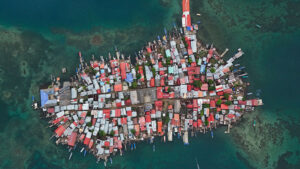
Residents of Gardj Sugdub, an island off Panama’s Caribbean coast, are facing an unprecedented upheaval as their home succumbs to rising sea levels. With a history dating back two centuries and housing around 300 families, the Gunas of Gardi Sugdub are being compelled to abandon their island life and businesses and relocate to the mainland as part of a $12 million project aimed at securing safer shores.
Steven Paton, director of the Smithsonian Institution’s physical monitoring program in Panama, attributes this relocation to the direct consequences of climate change, specifically the escalating sea levels. Gardi Sugdub’s residents are the vanguard of 63 communities scattered along Panama’s Caribbean and Pacific coasts, all poised to face relocation in the coming decades due to the encroaching sea.
The relocation initiative entails resettling individuals in a new area characterized by concrete houses set amidst a grid of paved streets. While the mainland lies just an eight-minute boat ride away, for many inhabitants, the move symbolizes a profound rupture with their past lives. Nadín Morales, 24, shares sentiments echoed by others preparing to depart, expressing a mix of nostalgia for their island existence and resignation to the inexorable reality of sinking shores.
Despite the mounting pressures, some residents have chosen to remain on Gardi Sugdub until circumstances render it untenable. The Panamanian Ministry of Housing emphasizes that no one is being coerced into leaving against their will. However, the fate of Gardi Sugdub is emblematic of a broader existential threat facing approximately 50 populated islands within the Guna Yala territory. These islands, including Gardj Sugdub, are mere meters above sea level and routinely experience inundation during periods of inclement weather, a phenomenon exacerbated by the warming oceans and intensifying storms driven by climate change.
According to Mr. Paton, the outlook is bleak, with projections indicating that all inhabited islands within the Guna Yala territory may need to be abandoned by the end of the century or sooner. This predicament underscores the global challenge posed by rising sea levels, affecting coastal communities worldwide at varying rates.
As Gardi Sugdub prepares to bid farewell to its storied past and confront an uncertain future, the plight of its residents serves as a poignant reminder of the urgent need for concerted action to mitigate the impacts of climate change.


